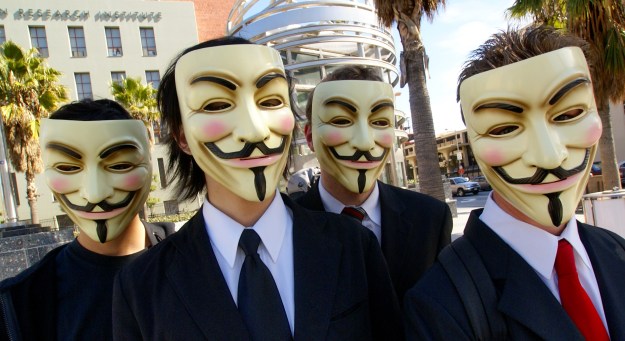
When you’re in the business of fighting major corporations, it’s important to not help their bottom line in the process. Unfortunately for hacktivist group Anonymous, whose corporate targets include Master Card, Visa, PayPal and others, they seem to be doing just that — at least a little bit.
The conflict of interest for Anonymous stems from the group’s mascot, Guy Fawkes, the 17th Century disestablishmentarian, who famously tried to blow up the House of Parliament on November 5, 1605. Masks of Guy Fawkes are often worn by Anonymous members at protests, and used in their press material and videos.
Problem is, the mask was originally designed for the movie about Fawkes called V for Vendetta — a movie made by Warner Bros, which is owned by Time Warner, the largest communications company in the world. As The New York Times reports, the Guy Fawkes mask has become the best-selling mask on Amazon.com, beating out masks of Batman, Harry Potter and Darth Vader. Because of Time Warner gets royalties for every Fawkes mask sold, Anonymous has, in its own little way, helped boost Time Warner’s profits, which totaled about $28 billion last year.
“We sell over 100,000 of these masks a year, and it’s by far the best-selling mask that we sell,” said Howard Beige, the executive vice president of Rubie’s Costumes, which makes the Fawkes mask. “In comparison, we usually only sell 5,000 or so of our other masks.”
Anonymous’ use of the Guy Fawkes masks goes back to one of the group’s first high-profile operations, one against the Church of Scientology, which took place in 2008. A group of Anonymous protesters wore the mask in front of Scientology’s headquarters. Many photographs and videos were taken of the group, and spread online. Since then, Guy Fawkes has become the face of Anonymous.
Of course, it should be said that a countless number of corporations and other businesses, big and small, indirectly profit off of Anonymous, as its members presumably pay for the computers, Internet access and other digital tools used to carry out their operations. And that doesn’t include the millions made in advertising through people reading about Anonymous on websites like this one. So, basically, this “news” should be taken with a grain of salt.


